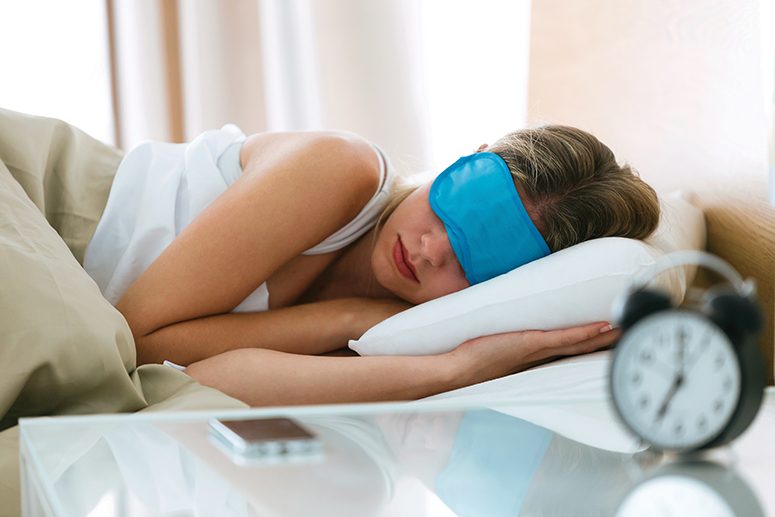jet lag

Flying across several time zones in a short time causes jet lag, also known as “rapid time-zone change syndrome.” The jet lag results from the body’s internal clock conflict with the day-night cycle at the new geographic location.
Symptoms: Symptoms of jet lag include feeling sleepy, hungry or alert at odd times, which affect people’s social life, ability to work, exercise, and sleep. The internal clock usually synchronizes with a new environment within a few days. However, the more times zones crossed, the more intense symptoms are likely to be and the longer they will take to abate.
Treatment: Melatonin is an effective jet lag treatment. Doses as small as 0.5 milligram of melatonin 30 minutes before your bedtime at your departure location might be helpful. Upon arrival at your destination, stay active during daylight hours and go to bed in the evening at your usual time. You may also want to take melatonin before your bedtime for the first few days at your destination. In the morning, getting some sunlight or exercise will help your circadian rhythm adjust.
In the U.S., melatonin is an over-the-counter substance that is classified as a food supplement, so it is not regulated. The amount of active ingredient in one dose may vary slightly from what is declared on the box, and some people may need a higher dose to feel any effect. Taking too much melatonin, however, may disrupt your sleep. Melatonin is considered nonaddictive and safe for short-term use, but it can interact with certain medications, including anticoagulants, immunosuppressants, diabetes medications and birth-control pills. If you have any health conditions, check with your doctor before using melatonin. Refrain from activities that require alertness, such as driving or diving, until four or five hours after taking melatonin.
Prevention: A few days to a week before your departure, try to gradually move your bedtime to what it will be at your destination. If you are traveling east, where night comes sooner than it does at your departure location, go to bed one hour earlier than you usually would for as many days as the number of time zones you’ll cross. To make it easier to fall asleep early, avoid caffeine, alcohol and exercise for three to four hours before your new bedtime. Then get up earlier in the morning and get some sunshine to help your body’s internal rhythm adjust. If you are traveling west, do the opposite: Gradually go to bed later and stay in bed longer in the days before your departure. If you have 12 hours of time zone changes, try to split up the adjustments into six hours of time zone changes before and after your departure date, if possible.
Poor sleep during an overnight flight can also exacerbate jet lag. Falling asleep on a plane can be difficult for several reasons. During sleep, the body’s temperature drops and the activity of some hormones changes. These events usually occur at a similar time every day and are prompted by changes in surrounding light and noise. With the onset of darkness, the pineal gland in the brain starts secreting the hormone melatonin, which helps the body fall asleep and stay asleep, but it is not strong enough to do so on its own. To sleep well during a flight, it is important to avoid excessive consumption of alcohol and caffeine. Drink plenty of water instead. Using earplugs and a blindfold to reduce noise and mimic darkness may also help.
Considerations for divers: Diving on the day you arrive at your destination after a long flight is not a good idea. Take some time to rest, have a light meal, and drink plenty of fluids. You may want to take melatonin at bedtime to get well-rested for diving the next day. If you arrive at your destination very late and take melatonin after midnight, you should abstain from the first morning dive if scheduled for less than five hours after taking the melatonin. Technical divers should be especially aware of this issue.
Recent studies have shown that animals deprived of sleep are more susceptible to seizures caused by hyperbaric oxygen; administering melatonin did not reverse this effect.17 The conclusion is that melatonin may help you get to sleep, but it can’t counteract a susceptibility to seizures.

Diving on the day you arrive at your destination after a long flight is not a good idea. Take some time to rest.
DAN Customer Service
Mon–Fri, 8:30 a.m. – 5 p.m. ET
+1 (919) 684-2948
+1 (800) 446-2671
Fax: +1 (919) 490-6630
24/7 Emergency Hotline
In event of a dive accident or injury, call local EMS first, then call DAN.
24/7 Emergency Hotline:
+1 (919) 684-9111
(Collect calls accepted)
DAN must arrange transportation for covered emergency medical evacuation fees to be paid.
Medical Information Line
Get answers to your nonemergency health and diving questions.
Mon–Fri, 8:30 a.m. – 5 p.m. ET
+1 (919) 684-2948, Option 4
Online: Ask A Medic
(Allow 24-48 hours for a response.)